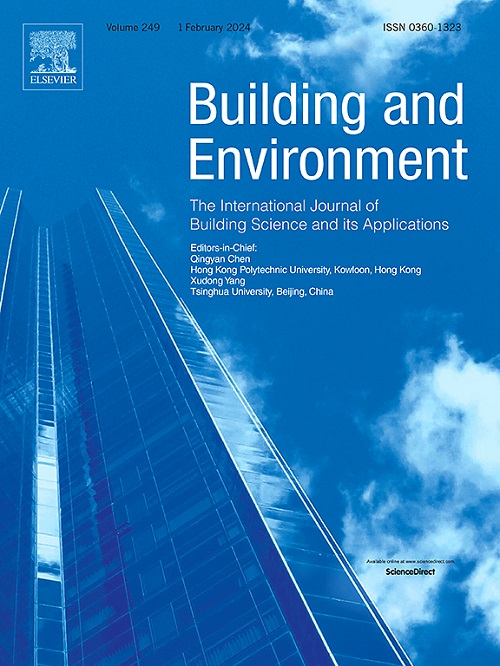Impact of momentum sources on pedestrian-level peak wind predictions of an urban-like array using large-eddy simulations and statistical models
IF 7.1
1区 工程技术
Q1 CONSTRUCTION & BUILDING TECHNOLOGY
引用次数: 0
Abstract
The effect of urban geometries on the peak wind speed at the pedestrian level was investigated using simplified urban-like arrays in wind tunnel experiments. To scrutinize the turbulent flow's spatial and temporal characteristics, large-eddy simulations (LESs) were adopted to simulate suitable experimental conditions using an external force accelerating the flow with the periodic boundary condition. Although previous studies have revealed that conventional LESs use a constant pressure gradient as a momentum source, driving the flow differs from those in developing boundary layers in experiments, and the effect of the momentum source on peak wind speeds at the pedestrian level remains unknown. Therefore, this study used a series of LESs based on the three driving methods to investigate the impact of the momentum provision on the relevant statistics and peak values. The turbulent statistics showed good agreement among the cases driven by the momentum sources regardless of the shape of the profiles of the momentum source. Peak wind speeds, quantified by percentiles, were estimated using statistical models based on the Weibull distribution. Overall, the results showed a good agreement between the LESs and statistical model estimations when higher-order moments were adopted as the estimation parameters.
利用大涡流模拟和统计模型预测动量源对城市类阵列行人层峰值风的影响
在风洞实验中,利用简化的类城市阵列研究了城市几何形状对行人层峰值风速的影响。为了仔细研究湍流的空间和时间特征,采用了大涡流模拟(LES)技术,利用外力加速流动,在周期性边界条件下模拟合适的实验条件。虽然以往的研究表明,传统的 LES 使用恒定的压力梯度作为动量源,但驱动流动的动量源与实验中发展边界层的动量源不同,而且动量源对行人层峰值风速的影响仍然未知。因此,本研究使用了一系列基于三种驱动方法的 LES,以研究动量提供对相关统计量和峰值的影响。在动量源驱动的情况下,无论动量源的剖面形状如何,湍流统计数据都显示出良好的一致性。使用基于威布尔分布的统计模型估算了以百分位数量化的峰值风速。总体而言,当采用高阶矩作为估算参数时,结果显示 LES 与统计模型估算结果之间具有良好的一致性。
本文章由计算机程序翻译,如有差异,请以英文原文为准。
求助全文
约1分钟内获得全文
求助全文
来源期刊

Building and Environment
工程技术-工程:环境
CiteScore
12.50
自引率
23.00%
发文量
1130
审稿时长
27 days
期刊介绍:
Building and Environment, an international journal, is dedicated to publishing original research papers, comprehensive review articles, editorials, and short communications in the fields of building science, urban physics, and human interaction with the indoor and outdoor built environment. The journal emphasizes innovative technologies and knowledge verified through measurement and analysis. It covers environmental performance across various spatial scales, from cities and communities to buildings and systems, fostering collaborative, multi-disciplinary research with broader significance.
 求助内容:
求助内容: 应助结果提醒方式:
应助结果提醒方式:


